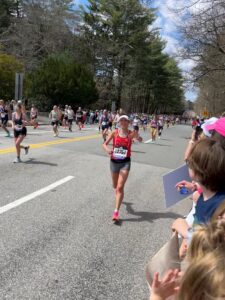It’s not a sprint… Christie Nie M.D. MSc. Vice President, Global Clinical Development answers questions about her career and Prothena’s clinical development team
From running marathons to developing potential breakthrough treatments, for Christie it’s all about perseverance
At Prothena, our mission is to bring life-changing therapies to patients battling neurodegenerative and rare peripheral amyloid diseases. Our clinical development efforts play a vital role in moving these therapies from early research to potential treatments that could improve the lives of millions. Behind this work is a talented team, including Christie Nie, M.D., MSc, Vice President, Global Clinical Development at Prothena, whose dedication to clinical development and passion for scientific innovation drive Prothena’s progress.
In this interview, Christie shares what initially drew her to clinical development, the rewards of working at Prothena, and why it’s so important to have women in STEM roles. She also reflects on how her experiences—like training for and completing the Boston Marathon—have shaped her approach to the challenges and triumphs of her career. Read on for Christie’s insights into what makes Prothena’s clinical development team so exceptional and how her personal goals fuel her professional drive.
Q: What drew you to a career in clinical development?
A: I come from a medical background so working in clinical development allows me to remain rooted in healthcare while having a greater impact on both individual patient care and medical science. In my job, I work on cutting-edge innovative and novel drug development that may help thousands of patients. Clinical development also offers a clear professional pathway to leadership in pharma/biotech companies. The opportunity to help others grow brings joy to my life.
Q: What is your favorite thing about working at Prothena?
A: The people. I have been working at Prothena for over 3.5 years. Since joining I have worked cross-functionally with many talented people. The culture at Prothena is very collaborative. My favorite thing is working with an interdisciplinary team to create a dynamic, diverse, and joyful environment in pursuit of shared goals.
Q: Why do you think it is important for women to work in STEM? Do you feel supported as a woman at Prothena?
A: I was very lucky to grow up in a family where my parents never treated me differently from my brother. I was told that I could achieve as much as I wanted as long as I put my mind to it. I did. We are also fortunate to live in a society where less gender stigma is imposed by others. However, we need more representation and role models of women in STEM, so that younger women feel empowered and inspired to continue to narrow the gender gap in STEM.
Q: What are you most proud of the Prothena clinical development team for accomplishing?
A: The clinical development team is working on a life-saving treatment for a rare disease which has significant impact on healthcare and patient outcomes. The team has been navigating the trial design and execution in an ever-changing clinical practice landscape. Given the fierce competition, I am most proud of the team for remaining focused and staying on course, overcoming scientific challenges and pushing the AFFIRM study to the finish line, to enable a successful filing in the upcoming year.
Q: What do you like to do in your spare time?
A: I love listening to audiobooks and running in my spare time (not often at the same time 😊). When I started running 15 years ago, running was just a social activity to make friends and stay healthy. After running for a while and racing some local 5k and 10k races, I realized that I could be very competitive in my age group. This has motivated me to learn everything about this sport and training seriously. I am curious to find out what my body is truly capable of.
Q: What learnings from your marathon experience can be applied to your work at Prothena?
A: So many!
Consistency, perseverance, and discipline: If you want to excel and flourish in sports, being disciplined, resilient and patient is vital. To be a good runner, the secret sauce is consistency. Training daily sometimes feels grinding, however, day in and day out work translates to growth and performance on race day. This mirrors the work at Prothena. Practicing similar traits and working to the best of my ability leads to timely and quality project delivery.
Adaptability: Conditions throughout a marathon can change—weather, terrain, or health—just as work can be unpredictable. Adapting and adjusting plans is crucial to moving forward. For example, I ran the Boston marathon this year, and the cold winter training didn’t prepare any of us to race in a hot and humid condition in New England in April. However, I adjusted my plan and increased my hydration (with the help from my co-worker Ingrid who passed me a cold bottle of Gatorade at mile 13!), which allowed me to finish strong.
Teamwork and competition: I run and race for the Shore Athletic Club team. So, winning a race is not simply an individual achievement but also helps the team. The competition in sports is very much like competition with our rivals. Competition helps us push further and faster to bring efficacious treatment to the patients.
